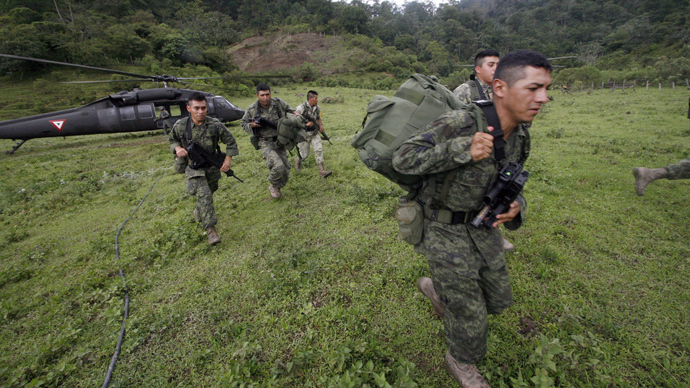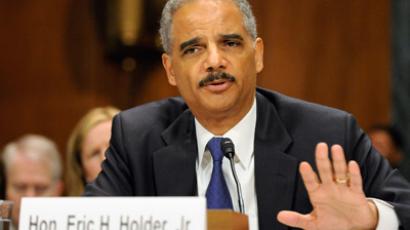Book by whistleblower at center of ‘Fast and Furious’ blocked by the ATF

A book authored by an agent at the center of the Bureau of Alcohol, Tobacco, Firearms and Explosives’ “Fast and Furious” gun running debacle has been rejected and barred from being published by the agency, citing concerns for morale.
Special Agent John Dodson, who became a whistleblower in 2011 when he approached Republican lawmakers in Congress with details of a botched attempt by the ATF to allow sales of firearms in order to build a case against Mexico’s powerful Sinaloa cartel, has already penned a book on the saga, though it was unclear on Monday whether it will ever see the light of day.
“This would have a negative impact on morale in the Phoenix [field division] and would have a detremental [sic] effect on our relationships with [the Drug Enforcement Administration] and FBI,” the ATF’s rejection letter stated.
Current restrictions prevent federal employees from profiting from “any source other than the government for teaching, speaking or writing that relates to the employee’s official duties,” ruling out the possibility for Dodson to cash in on any book deal.
According to officials who spoke with the Washington Post, the ATF is currently evaluating whether Dodson’s book divulges any “law enforcement sensitive” information. Dodson could be allowed to publish his book while receiving no monetary compensation.
The American Civil Liberties Union, which is representing Dodson on the matter, filed a protest on Monday with the ATF’s Deputy Director Thomas Brandon over his agency’s efforts to block the book’s publishing, citing a violation of Dodson’s constitutional rights.
“It was Agent Dodson’s disclosures that helped bring the operational failures at the Phoenix field division to light. As a knowledgeable and informed ‘insider’ who was directly involved in Operation Fast and Furious, Agent Dodson will add significantly to the national conversation about gun policy,” writes the ACLU.
Senator Charles Grassley and Representative Darrell Issa, two Republicans who spearheaded a Congressional investigation into the ATF’s “Fast and Furious” operation, have written a foreword for Dodson’s book.
Responding to the ATF’s rejection of Dodson’s book, Grassley noted that “this isn’t the first time somebody from the ATF or another government agency has written a book.”
“Just because the ATF leadership doesn’t like the content of the book doesn’t mean they should be able to prevent the author from giving his side of the story,” adds Grassley.
Sen. Grassley, Senate Judiciary Committee Ranking Member, and Rep. Issa, House Oversight and Government Reform Committee Chairman, produced an expansive joint report on “Fast and Furious” consisting of over 2,000 pages of dozens of interviews and a review of more than 10,000 pages of documents.
That Congressional inquiry also led to accusations that the Justice Department had withheld documents and denied access to witnesses, which culminated in Attorney General Eric Holder being held in contempt of Congress in June of 2012. The investigation also led to the resignation of Arizona US Attorney Dennis Burke and the reassignment of ATF acting director Kenneth Melson.
Dodson, who began to write his book last year, sought permission for external employment allowing him to secure a publisher in June, according to the Washington Times.
A manuscript was presented to Dodson’s superior in Washington in May, and to an immediate superior in Arizona in July. According to documents first reported by the Washington Times his request was rejected first in Arizona in July, and backed by the ATF’s head in that office four days later.
Testimony presented by Dodson of his first day of undercover work in Phoenix was possibly some of the most embarrassing for the ATF. While trailing a suspected gun runner who had just purchased 10 semiautomatic rifles from a Phoenix gun store, Dodson and another agent sought permission to seize the guns, but were rebuffed by superiors who hoped to instead trace the firearms back to more significant figures within the Sinaloa drug cartel.
Dodson and some fellow ATF agents disagreed with what they considered a large volume of arms being allowed to flow into Mexico in the “gun walking” sting program. In one case, two AK-47 semiautomatic rifles sold at a Phoenix gun store monitored by the ATF were linked to the deadly Arizona shooting of US Border Patrol Agent Brian Terry in December of 2010.
"Fast and Furious" was launched in the fall of 2009, at which point the ATF estimated that 90 percent of firearms recovered for tracing by Mexican authorities struggling to deal with spiking cartel violence were originating in the US.














